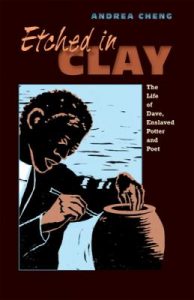Etched in Clay; The Life of Dave, Enslaved Potter and Poet by Andrea Cheng; illustrated with woodcuts by the author; Lee & Low, 2013. 143 pages; $17.95 (hardcover); reading level: ages 10 and up.
Born into slavery in 1801, Dave should have lived an invisible life and died unknown. That he didn’t is due to an almost miraculous series of events. His first known owner, a potter, discovers Dave has a genius for creating pots; Dave, using a spelling book the owner’s pious wife leaves for him to find, teaches himself to read; and, ignoring the law that a literate slave could be put to death, Dave brazenly begins carving his name and some lines of poetry into his pots. Cheng uses narrative poems as spare as the bits of research she works from, filling in the gaps with intelligently imagined detail. Each poem is narrated by a different player in the drama, giving the reader a view of both what Dave sees and of how he is seen: “What would a potter slave/like you/do in Alabama anyway,/ where there are/ no pottery works?” asks his kindly owner, when Dave begs to be sold along with his wife. “…I suspect he was dead,” says a passenger on the train that runs over Dave leaving him with only one leg. “I wonder where is all my relation/friendship to all – and, every nation,” writes Dave, remembering the mother he never knew and the wife who’s been torn away from him. An introduction, list of characters, and backmatter flesh out this searingly beautiful story of a slave who should have remained silent…but chose not to.


